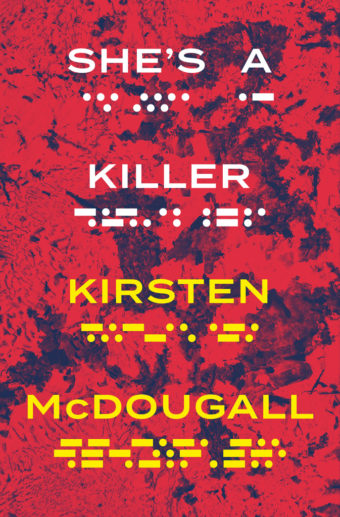Let’s start with some scene-setting.
Rioting continued in Palmerston North over water and rates costs being driven up by the arrival of one thousand new wealthugee settlers; one protester had been shot and was in a critical condition in hospital. A non-violent protest was being held by iwi in the Wairarapa over former DOC land being sold by the government to overseas investors. A spokesperson called it third-wave colonisation and theft. A hīkoi was being planned from Cape Rēinga to parliament to remind government of its Te Tiriti obligations. The dead zone in the Gulf of Mexico had increased by 6,000 square kilometres. MPI was predicting food shortages this summer due to extended droughts across the North Island, and as a result more Specials were being trained to deal with potential rioting.
I read that paragraph from Kirsten McDougall’s lively, engaging and often hilarious satirical novel She’s a Killer on the very day that a convoy of cars and trucks descended on Wellington and offloaded its anti-vaccine, anti-science and anti-government passengers, who then set up a ‘freedom camp’ on the lawn of Parliament. At the time of writing, they are still there, sinking into the mud and distrusting official narratives, while the rest of us observe pandemic restrictions. Speculative fiction suddenly didn’t seem quite so speculative. Instead, it was almost torn from the headlines.
McDougall has created a world that slips easily between the entirely recognisable and the slightly strange. Water is rationed in this vision of the near future. Inflation is through the roof. The gap between rich and poor has turned into a chasm, and security guards are stationed outside posh supermarkets. Yet ordinary life goes on: people still work, take the bus, pay their bills. The novel is set sometime after ‘the last pandemic’, which is presumably the one we are now in. The government’s pandemic response put the country so deeply in debt that wealthy climate refugees were welcomed: imagine a flood of the American mega-rich sheltering in their lifestyle bunkers, as anticipated in journalist Mark O’Connell’s apocalypse-preparation reporting. I’m pretty sure McDougall has coined the word ‘wealthugee’. It may become useful in the real world.
McDougall doesn’t waste time on world-building; this picture of New Zealand is really just the present with a gentle nudge forward, and it seems entirely plausible. Her vision is very funny and down to earth, too, as this quick description of Wellington shows:
This city was windy and grey. Its buildings were ugly and boring. Sure, we had trees and the harbour. But the harbour had poo leaking into it and you couldn’t swim there even on the days when it was warm enough.
Is that the capital in the near future or in the year 2022?
McDougall’s greatest creation is her narrator, who is apparently named Alice, although the name appears nowhere in the text. Troubled, brutally honest, unstable, and again, very funny, Alice is in her late thirties, single, living in a flat below her monstrous mother (with whom she communicates in Morse code) and stuck in a dull job at the university. She has an IQ just one point below genius level, and she has the bitter superiority of those with wasted potential. She is sassy, antagonistic and self-destructive, or just plain destructive. The reappearance of her childhood imaginary friend, Simp, suggests that things are about to take a disastrous turn. Simp is a nagging voice in her head that she talks to and argues with out loud (‘I knew that I was screaming and that people were taking a wide berth, staring at me as they passed’).
In her job at the university, Alice meets Pablo, a wealthugee who hopes to study Russian literature, which the university no longer offers. Gradually, she is drawn into a convoluted plot that generates some real suspense in the last 100 pages of the novel. But as good as that suspense is, I think that this highly entertaining novel is at its best when McDougall is satirising the minutiae of Wellington life through the exaggerated perspective of Alice, a sharp, amoral and prickly character that gives her permission to say almost anything (the C-word is deployed no fewer than nine times in this novel — is that a record for this publisher?). There are some very funny riffs about workplace culture, advertising agencies, craft beer wankery and drama schools, and scepticism about the kinds of activists who would oppose an influx of wealthugees, along with an equal level of scepticism about the wealthugees themselves. McDougall and Alice both seem to be opposed to earnestness.
‘I’m a fan of unhappy endings,’ Alice quips early on. ‘They’re more honest.’ After McDougall’s darker but shorter debut novel, Tess, which had a different kind of troubled or gifted narrator, this novel surprises us with its immediacy and broad appeal. Yes, it is a black comedy about the end of the world (someone wonders if ‘the time of the human has ended’), but it is also a direct, uncomplicated, energetic and well-told story. It’s both topical and highly accessible, and it’s good to see that it has been finding the wider audience that McDougall deserves.
This review was originally published on the Academy of NZ Literature site.



